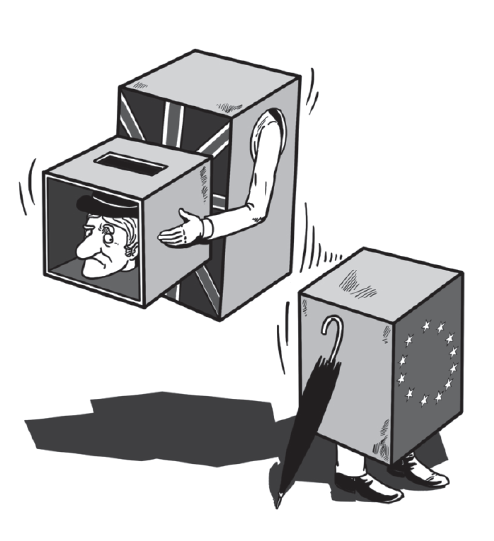 |
| Li Feng / China Daily |
Britons voted in Friday's referendum to leave the European Union, with the "Leave" camp securing about 4 percent more votes than the "Remain" camp. In 1975, just two years after the UK was granted European Economic Community membership, nearly two-thirds of Britons had voted in a similar referendum to stay in the bloc.
The "Leave" vote, not surprisingly, has divided British society. Some in London have even proposed to launch a campaign to separate London from the country and make it a European Union member.
The social division will almost certainly reshape the country's public agenda and political priorities. It may also have an impact on British integration. Scotland's First Minister Nicola Sturgeon said on Sunday that the Scottish Parliament could consider vetoing legislation on the UK's exit from the EU.
The EU referendum has drawn a great number of British families, communities, companies and organizations into a debate over their country's future now that the social order is about to change. It has also turned the UK's market-oriented integration with Europe into a political issue that has everything to do with British sovereignty.
Letting a referendum, rather than systematic and orderly governance, decide the fate of a country that has reached a historic crossroad may not be the best option. In the UK's case, the "Leave" camp's narrow victory shows the country's future as a EU member depended on a few swing voters, as many in the "Remain" camp are yet to give up their pursuit despite having lost.
In other words, a primitively designed referendum like the one Britain just held, is in essence about swing votes, and may easily expose the country to a world of uncertainties. Technical changes, if not an overhaul, are thus needed to keep the divisions in British society under control.
For one, implementing a rule that requires at least two-thirds, not half, of the vote to pass a decision, should be considered to prevent some swing voters from deciding a country's future. Appointing one representative in each precinct and adding their votes to the final results is another feasible choice that can effectively combine the division in voters nationwide and the cohesion among individual communities.
Further changes in the timing of the vote should also be made, if need be, to avoid divisions created by vested interests.
Such a referendum based on direct votes, with a simple majority principle, can easily divide a society and make it a toy in the hands of populists and force the people to swallow the result of such ill-conceived referendums.
The author is a professor of public governance at Renmin University of China.